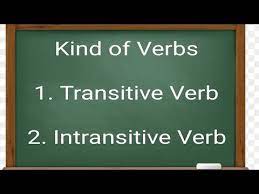Back to: English Language Primary 6
Welcome to today’s class!!
We are thrilled to have you join our class!!
In today’s English class, we will be learning about Types of Verbs

Types of Verbs
In our previous class we learned that verbs are best described as the heart of English Sentences. Verbs are found in our everyday words.
Let’s look at the types of verbs we have
- Action Verbs
Action verbs express specific actions and are used any time you want to show action or discuss someone doing something. It is important to remember that the action does not have to be physical.
Action Verb Examples:
- Run
- Dance
- Slide
- Jump
- Think
- Do
- Go
- Stand
- Smile
- Listen.
Action Verb Sentences
- I run faster than David.

- He does it well.

- She thinks about poetry all day long

Transitive Verbs
Transitive verbs are action verbs that always express doable activities that relate or affect someone or something else.
In a sentence with a transitive verb, someone or something receives the action of the verb.
Transitive Verb Examples:
- Love
- Respect
- Tolerate
- Believe
- Maintain
The Transitive Sentences
Deolu ate the cookies.
The transitive verb is ate, Deolu is the subject, because it is Deolu who is doing the eating, and the cookies are the direct object, because it is the cookies that are being eaten. Other examples:
He kicked John.
John punches him.
They sold the tickets.
Intransitive Verbs
Intransitive verbs are action verbs that always express doable activities. They are different from transitive verbs because there is no direct object following an intransitive verb.
Intransitive Verb Examples:
- Walk
- Laugh
- Cough
- Play
- Run
Intransitive sentences
We traveled to London.

The intransitive verb is traveled, the subject is we, because we are traveling, but London is not a direct object because London is not receiving the action of the verb. Other examples:
I sneeze in the morning.
He arrived with moments to spare.
Kathryn sat away from the others.
Auxiliary Verbs
Auxiliary verbs are also known as helping verbs and are used together with a main verb to show the verb’s tense or to form a question or negative.
Some common examples of auxiliary verbs include have, might, will. These auxiliary verbs give some meaning to the main verb, for example, letting the reader know when the action took place.
Auxiliary Verb Examples:
- Would
- Should
- Do
- Can
- Did
- Could
- May
Evaluation
Mention (3) ways to differentiate between an auxiliary and intransitive verbs.
Reading Assignment
English Grammar, Book 6: Verbs and their types.
Weekend Assignment
List all the types of verbs and give two examples each.
types
We hope you found today’s class impactful! Let us know if you have any questions, and we’ll reply swiftly!
See you in our next class!!

This is nice. thanks